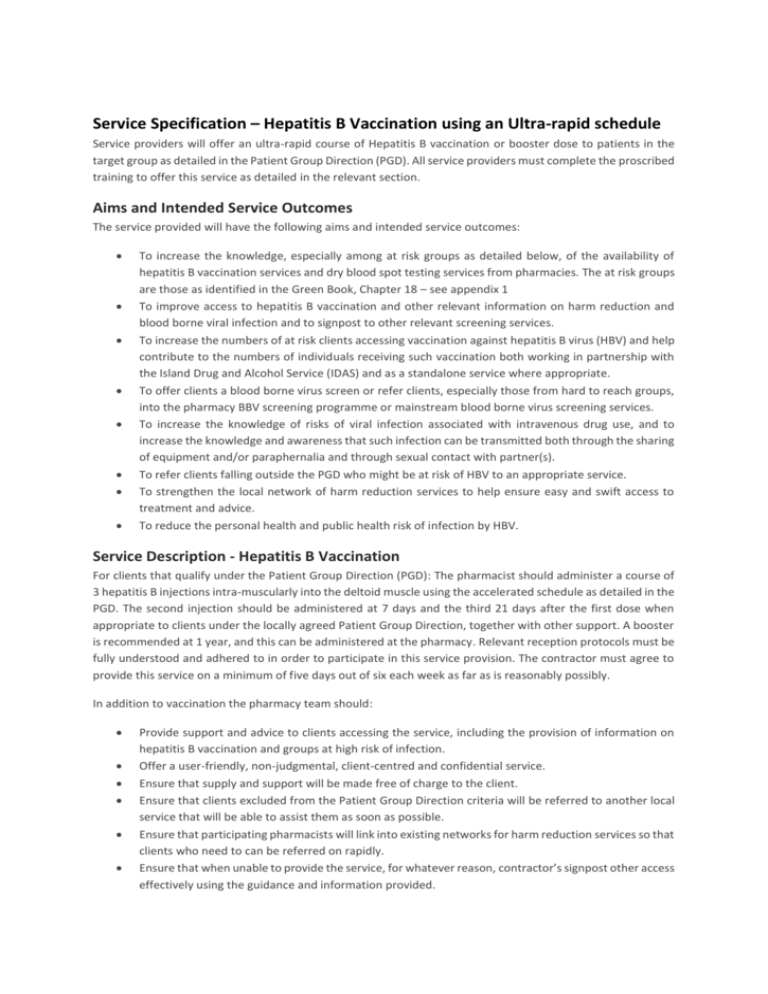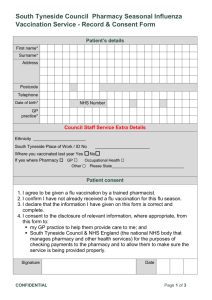Service Specification – Hepatitis B Vaccination using an Ultra
advertisement

Service Specification – Hepatitis B Vaccination using an Ultra-rapid schedule Service providers will offer an ultra-rapid course of Hepatitis B vaccination or booster dose to patients in the target group as detailed in the Patient Group Direction (PGD). All service providers must complete the proscribed training to offer this service as detailed in the relevant section. Aims and Intended Service Outcomes The service provided will have the following aims and intended service outcomes: To increase the knowledge, especially among at risk groups as detailed below, of the availability of hepatitis B vaccination services and dry blood spot testing services from pharmacies. The at risk groups are those as identified in the Green Book, Chapter 18 – see appendix 1 To improve access to hepatitis B vaccination and other relevant information on harm reduction and blood borne viral infection and to signpost to other relevant screening services. To increase the numbers of at risk clients accessing vaccination against hepatitis B virus (HBV) and help contribute to the numbers of individuals receiving such vaccination both working in partnership with the Island Drug and Alcohol Service (IDAS) and as a standalone service where appropriate. To offer clients a blood borne virus screen or refer clients, especially those from hard to reach groups, into the pharmacy BBV screening programme or mainstream blood borne virus screening services. To increase the knowledge of risks of viral infection associated with intravenous drug use, and to increase the knowledge and awareness that such infection can be transmitted both through the sharing of equipment and/or paraphernalia and through sexual contact with partner(s). To refer clients falling outside the PGD who might be at risk of HBV to an appropriate service. To strengthen the local network of harm reduction services to help ensure easy and swift access to treatment and advice. To reduce the personal health and public health risk of infection by HBV. Service Description - Hepatitis B Vaccination For clients that qualify under the Patient Group Direction (PGD): The pharmacist should administer a course of 3 hepatitis B injections intra-muscularly into the deltoid muscle using the accelerated schedule as detailed in the PGD. The second injection should be administered at 7 days and the third 21 days after the first dose when appropriate to clients under the locally agreed Patient Group Direction, together with other support. A booster is recommended at 1 year, and this can be administered at the pharmacy. Relevant reception protocols must be fully understood and adhered to in order to participate in this service provision. The contractor must agree to provide this service on a minimum of five days out of six each week as far as is reasonably possibly. In addition to vaccination the pharmacy team should: Provide support and advice to clients accessing the service, including the provision of information on hepatitis B vaccination and groups at high risk of infection. Offer a user-friendly, non-judgmental, client-centred and confidential service. Ensure that supply and support will be made free of charge to the client. Ensure that clients excluded from the Patient Group Direction criteria will be referred to another local service that will be able to assist them as soon as possible. Ensure that participating pharmacists will link into existing networks for harm reduction services so that clients who need to can be referred on rapidly. Ensure that when unable to provide the service, for whatever reason, contractor’s signpost other access effectively using the guidance and information provided. Training and Staffing Requirements Service providers will ensure that participating pharmacists meet the requirements of the Competency and Training Framework for the administration of intra-muscular vaccination and dealing with Basic Life Support and anaphylaxis. Such training will provided by an accredited trainer who will deliver training to providers that meets the national standards for this type of service provision. The training required is detailed below: Completion of M&K Updates vaccination training Update Basic Life Support and anaphylaxis All providers must ensure that participating pharmacists and staff complete the relevant local training required by the Patient Group Direction. All service providers have a duty to ensure that pharmacists and staff involved in the provision of the service are aware of and operate within local protocols. Service outline at participating pharmacies The pharmacy must provide a sufficient level of privacy (ideally at the level requirement for the provision of Advanced Services as detailed in The Pharmaceutical Services (Advanced and Enhances Services) (England) Directions 2012 (as amended). A service will be provided that assesses the need and suitability for a client to receive hepatitis B vaccination, in line with the Patient Group Direction and the inclusion and exclusion criteria: Where deemed appropriate, the pharmacy must administer the dose according to the legal requirements including appropriate labelling and recording in the Patient Medication Record system. Where deemed inappropriate, the pharmacy will provide advice and refer to another source of assistance. In addition, clients identified as at risk should also be offered screening for infection with HBV, HIV, HCV and Syphilis. Where the client is considered part of a client group that has been notified as requiring testing, the pharmacy will carry out a dry blood spot test to screen for infection with HBV, HCV, HIV and syphilis. The pharmacy must record service details and auditable data that relate to reasons for accessing the service, the demographics of the client and means of accessing the service. Data recording will be via the PharmOutcomes platform. The pharmacy must provide verbal and written advice on the avoidance of both Blood Borne Viral infections and Sexually Transmitted Infections, and the use of regular contraceptive methods, including advice on the use of condoms, to the client. This should be supplemented by a referral to a service that can provide treatment and further advice and care if necessary. The pharmacy must maintain appropriate records to ensure effective ongoing service delivery and audit. Records will be confidential and should be stored securely and for a length of time in line with local NHS record retention policies, currently eight years. PharmOutcomes will provides a suitable means of secure storage. Pharmacists may need to share relevant information with other health care professionals and agencies, in line with locally determined confidentiality arrangements, including, where appropriate, the need for the permission of the client to share the information. All providers should attend the annual support event to promote service development and update pharmacy staff with new developments, knowledge and evidence. PharmOutcomes will be used to record all relevant service information for the purposes of audit and the claiming of payment. Quality Indicators for participating pharmacies The pharmacy should display provided health promotion material and make this available for the potential client group and promote its uptake. The pharmacy should review its standard operating procedures and the referral pathways for the service on an annual basis. The pharmacy should be able to demonstrate that pharmacists and staff involved in the provision of the service have undertaken CPD relevant to this service. The pharmacy should participate in an annual audit of service provision. The pharmacy should co-operate with any locally agreed assessment of service user experience. Reliability of service provider will be monitored by Pinnacle Health Partnership LLP. Access to audit information The pharmacy can access performance information from the “Reports” tab on PharmOutcomes. All claim information for service delivery is available from the “Claims” tab Remuneration and Reimbursement Vaccination Providers Pinnacle Health LLP will pay a sum as agreed between itself, the Local Representative Committee and other commissioning partners to the pharmacy contractor. The process will be The provider makes a monthly claim for provision of the service. This claim is to be made using the PharmOutcomes platform. Payment claims will be auto-extracted on the 7th day of each month following service provision with payment to contractors within 30 days. Payments will consist of the professional fee due and costs of vaccines, as required. Payment will be within 30 days from the end of the calendar month in which the claim is received.






